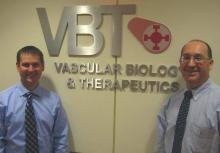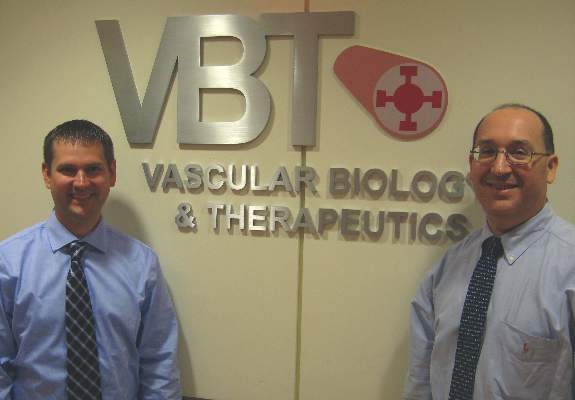User login
Even though the use of arteriovenous fistulae (AVF) is considered optimal for hemodialysis access in patients with end-stage renal disease, outcomes for AVF are among the worst for any vascular procedure. Low rates of maturation result in up to 60% of fistulae failing to become suitable for dialysis. This year’s Resident Research Prize winner, Dr. Trenton Foster will report on research that he and his colleagues performed to examine the molecular biology of fistula development with the eventual goal of providing therapeutic targets and strategies to improve AVF maturation.
Working with his mentor, Dr. Alan Dardik, Dr. Foster and his colleagues at the Yale University School of Medicine, have built upon their earlier research showing that Eph (Erythropoietin-producing hepatocellular carcinoma)-B4 activity prevents adaptive remodeling in vein grafts. They hypothosized that Eph-B4 mediates AVF maturation.
Dr. Foster will present their research, which used a mouse model in which an infrarenal aorto-caval AVF was created, as well as a Wistar rat infrarenal patch model.
Human studies using high-resolution imaging have documented venous wall thickening and outward remodeling as consistent components of successful venous remodeling, according to the researchers. Venous remodeling is characterized by increased deposition of smooth muscle cells and changes in extracellular matrix component expression resulting in venous wall thickening and reduced compliance. However, it is not currently understood which aspects of remodeling are critical for successful venous adaptation to the arterial environment, according to Dr. Foster.
In control mice, by day 7, Eph-B4 protein expression increased a significant 2.3-fold in the fistula compared to sham veins. Similarly, venous patch neointimal thickening with a fistula showed a significant 3.8-fold increase in Eph-B4, compared to controls without fistulae. Stimulation of Eph-B4 with Ephrin-B2/Fc showed a sixfold significantly increased colocalization of Eph-B4 and p-Tyr (phosphotyrosine) immunoreactivity by day 21, and significantly reduced fistula diameter and reduced fistula wall thickness, according to Dr. Foster.
“To confirm an inhibitory role for Eph-B4 during AVF maturation, we used Eph-B4 heterozygous mice to determine whether AVF created in mice with less Eph-B4 activity would show altered outward remodeling or wall thickening,” said Dr. Foster. Eph-B4 heterozygous mice showed reduced Eph-B4 expression and AVF in Eph-B4 heterozygous mice had increased fistula wall thickening compared to AVF in wild-type mice, with a corresponding increase in proliferating cells and with no decrease in apoptotic cells. “These data confirm an inhibitory role of Eph-B4 on wall thickening during AVF maturation,” Dr. Foster said.
It is known that Eph-B4 activates the Akt (protein kinase B) pathway to promote cell migration and proliferation. Akt is a regulator of cellular metabolism affecting protein synthesis, cell growth, and promoting cell survival, all of which are essential functions critical to venous remodeling. Dr. Foster and his colleagues previously showed that Akt expression is upregulated during vein graft adaptation, suggesting a role for Akt during AVF maturation.
“Our study shows that Eph-B4 expression increases during AVF maturation and that Eph-B4 activity inhibits venous remodeling through an Akt-1-mediated mechanism. Eph-B4 is normally present in adult veins and may be a potential therapeutic target to reduce pathologic venous remodeling with failure of fistula maturation. These results suggest that strategies to alter Eph-B4 activity may improve AVF maturation,” concluded Dr. Foster and his colleagues.
Even though the use of arteriovenous fistulae (AVF) is considered optimal for hemodialysis access in patients with end-stage renal disease, outcomes for AVF are among the worst for any vascular procedure. Low rates of maturation result in up to 60% of fistulae failing to become suitable for dialysis. This year’s Resident Research Prize winner, Dr. Trenton Foster will report on research that he and his colleagues performed to examine the molecular biology of fistula development with the eventual goal of providing therapeutic targets and strategies to improve AVF maturation.
Working with his mentor, Dr. Alan Dardik, Dr. Foster and his colleagues at the Yale University School of Medicine, have built upon their earlier research showing that Eph (Erythropoietin-producing hepatocellular carcinoma)-B4 activity prevents adaptive remodeling in vein grafts. They hypothosized that Eph-B4 mediates AVF maturation.
Dr. Foster will present their research, which used a mouse model in which an infrarenal aorto-caval AVF was created, as well as a Wistar rat infrarenal patch model.
Human studies using high-resolution imaging have documented venous wall thickening and outward remodeling as consistent components of successful venous remodeling, according to the researchers. Venous remodeling is characterized by increased deposition of smooth muscle cells and changes in extracellular matrix component expression resulting in venous wall thickening and reduced compliance. However, it is not currently understood which aspects of remodeling are critical for successful venous adaptation to the arterial environment, according to Dr. Foster.
In control mice, by day 7, Eph-B4 protein expression increased a significant 2.3-fold in the fistula compared to sham veins. Similarly, venous patch neointimal thickening with a fistula showed a significant 3.8-fold increase in Eph-B4, compared to controls without fistulae. Stimulation of Eph-B4 with Ephrin-B2/Fc showed a sixfold significantly increased colocalization of Eph-B4 and p-Tyr (phosphotyrosine) immunoreactivity by day 21, and significantly reduced fistula diameter and reduced fistula wall thickness, according to Dr. Foster.
“To confirm an inhibitory role for Eph-B4 during AVF maturation, we used Eph-B4 heterozygous mice to determine whether AVF created in mice with less Eph-B4 activity would show altered outward remodeling or wall thickening,” said Dr. Foster. Eph-B4 heterozygous mice showed reduced Eph-B4 expression and AVF in Eph-B4 heterozygous mice had increased fistula wall thickening compared to AVF in wild-type mice, with a corresponding increase in proliferating cells and with no decrease in apoptotic cells. “These data confirm an inhibitory role of Eph-B4 on wall thickening during AVF maturation,” Dr. Foster said.
It is known that Eph-B4 activates the Akt (protein kinase B) pathway to promote cell migration and proliferation. Akt is a regulator of cellular metabolism affecting protein synthesis, cell growth, and promoting cell survival, all of which are essential functions critical to venous remodeling. Dr. Foster and his colleagues previously showed that Akt expression is upregulated during vein graft adaptation, suggesting a role for Akt during AVF maturation.
“Our study shows that Eph-B4 expression increases during AVF maturation and that Eph-B4 activity inhibits venous remodeling through an Akt-1-mediated mechanism. Eph-B4 is normally present in adult veins and may be a potential therapeutic target to reduce pathologic venous remodeling with failure of fistula maturation. These results suggest that strategies to alter Eph-B4 activity may improve AVF maturation,” concluded Dr. Foster and his colleagues.
Even though the use of arteriovenous fistulae (AVF) is considered optimal for hemodialysis access in patients with end-stage renal disease, outcomes for AVF are among the worst for any vascular procedure. Low rates of maturation result in up to 60% of fistulae failing to become suitable for dialysis. This year’s Resident Research Prize winner, Dr. Trenton Foster will report on research that he and his colleagues performed to examine the molecular biology of fistula development with the eventual goal of providing therapeutic targets and strategies to improve AVF maturation.
Working with his mentor, Dr. Alan Dardik, Dr. Foster and his colleagues at the Yale University School of Medicine, have built upon their earlier research showing that Eph (Erythropoietin-producing hepatocellular carcinoma)-B4 activity prevents adaptive remodeling in vein grafts. They hypothosized that Eph-B4 mediates AVF maturation.
Dr. Foster will present their research, which used a mouse model in which an infrarenal aorto-caval AVF was created, as well as a Wistar rat infrarenal patch model.
Human studies using high-resolution imaging have documented venous wall thickening and outward remodeling as consistent components of successful venous remodeling, according to the researchers. Venous remodeling is characterized by increased deposition of smooth muscle cells and changes in extracellular matrix component expression resulting in venous wall thickening and reduced compliance. However, it is not currently understood which aspects of remodeling are critical for successful venous adaptation to the arterial environment, according to Dr. Foster.
In control mice, by day 7, Eph-B4 protein expression increased a significant 2.3-fold in the fistula compared to sham veins. Similarly, venous patch neointimal thickening with a fistula showed a significant 3.8-fold increase in Eph-B4, compared to controls without fistulae. Stimulation of Eph-B4 with Ephrin-B2/Fc showed a sixfold significantly increased colocalization of Eph-B4 and p-Tyr (phosphotyrosine) immunoreactivity by day 21, and significantly reduced fistula diameter and reduced fistula wall thickness, according to Dr. Foster.
“To confirm an inhibitory role for Eph-B4 during AVF maturation, we used Eph-B4 heterozygous mice to determine whether AVF created in mice with less Eph-B4 activity would show altered outward remodeling or wall thickening,” said Dr. Foster. Eph-B4 heterozygous mice showed reduced Eph-B4 expression and AVF in Eph-B4 heterozygous mice had increased fistula wall thickening compared to AVF in wild-type mice, with a corresponding increase in proliferating cells and with no decrease in apoptotic cells. “These data confirm an inhibitory role of Eph-B4 on wall thickening during AVF maturation,” Dr. Foster said.
It is known that Eph-B4 activates the Akt (protein kinase B) pathway to promote cell migration and proliferation. Akt is a regulator of cellular metabolism affecting protein synthesis, cell growth, and promoting cell survival, all of which are essential functions critical to venous remodeling. Dr. Foster and his colleagues previously showed that Akt expression is upregulated during vein graft adaptation, suggesting a role for Akt during AVF maturation.
“Our study shows that Eph-B4 expression increases during AVF maturation and that Eph-B4 activity inhibits venous remodeling through an Akt-1-mediated mechanism. Eph-B4 is normally present in adult veins and may be a potential therapeutic target to reduce pathologic venous remodeling with failure of fistula maturation. These results suggest that strategies to alter Eph-B4 activity may improve AVF maturation,” concluded Dr. Foster and his colleagues.

